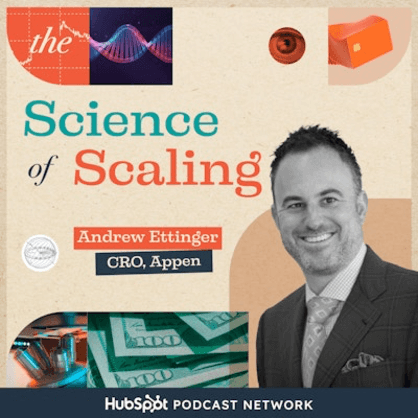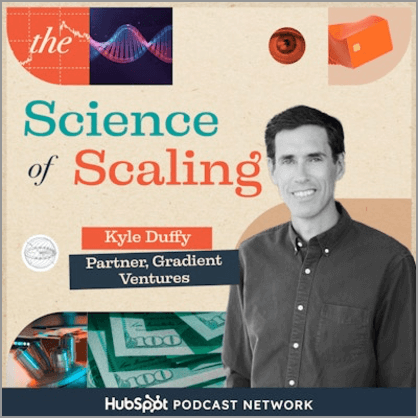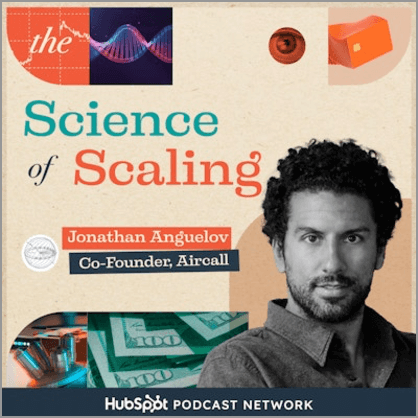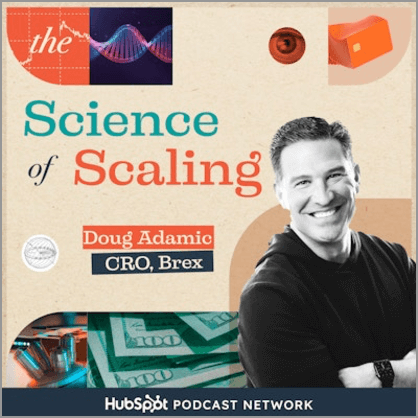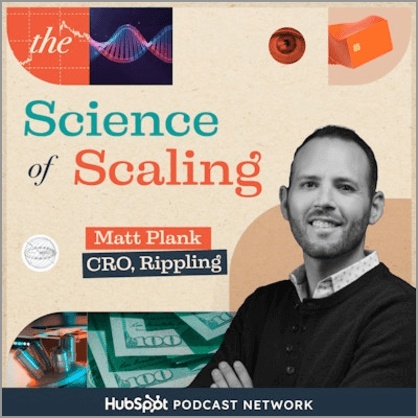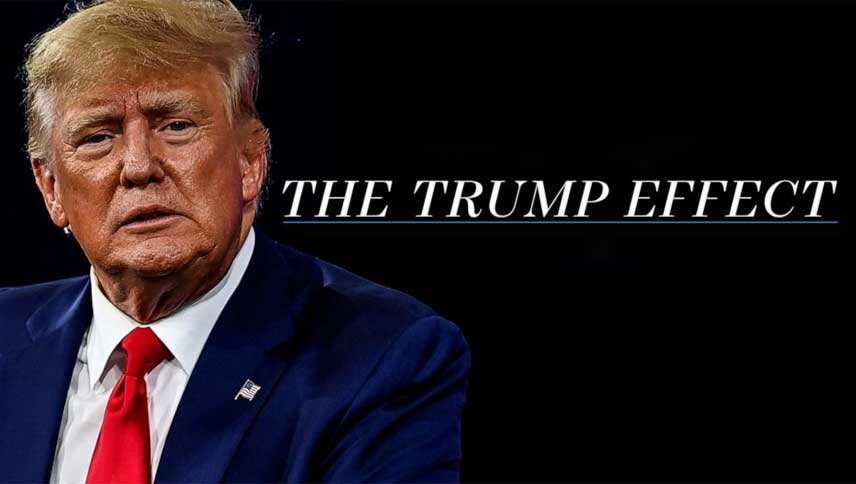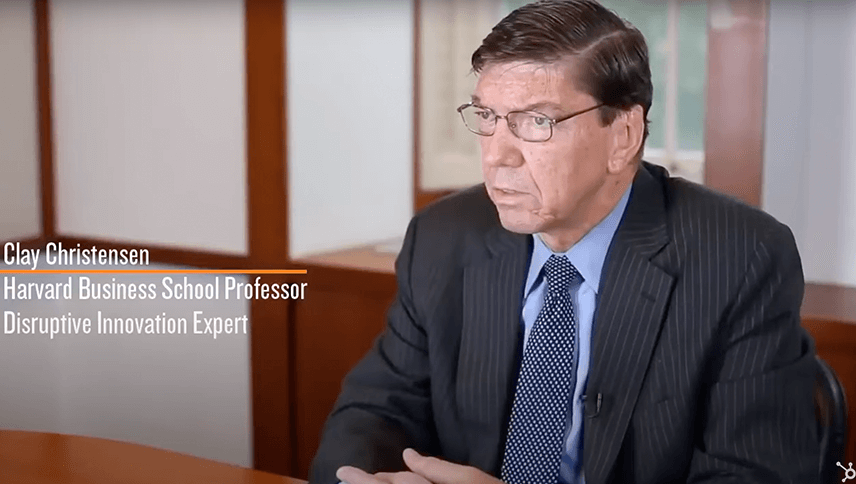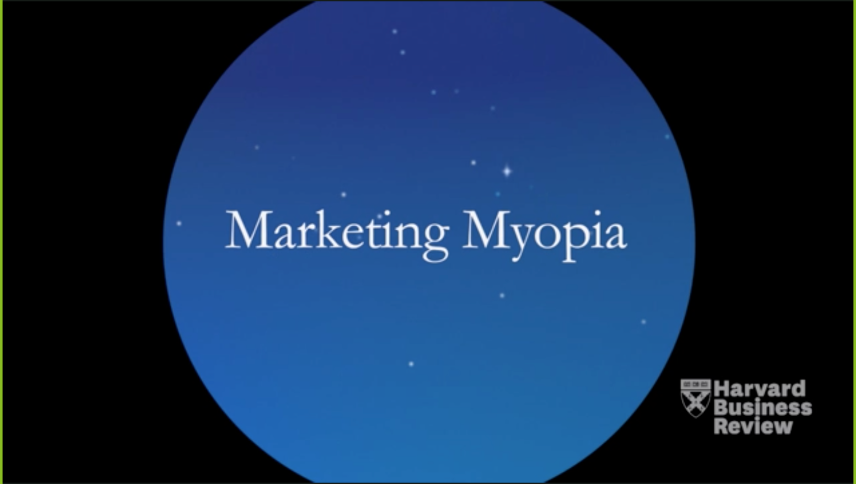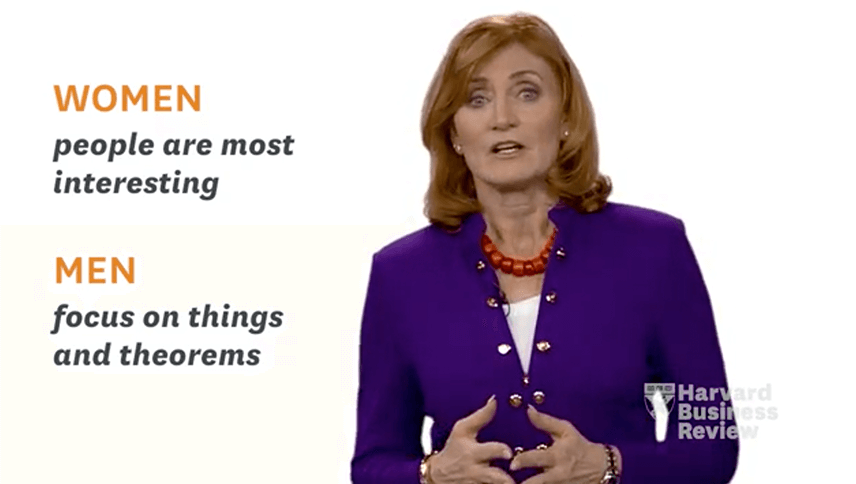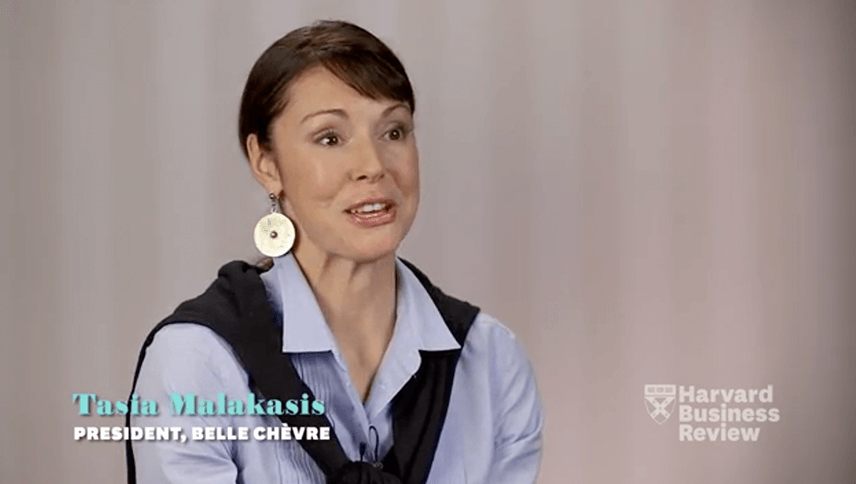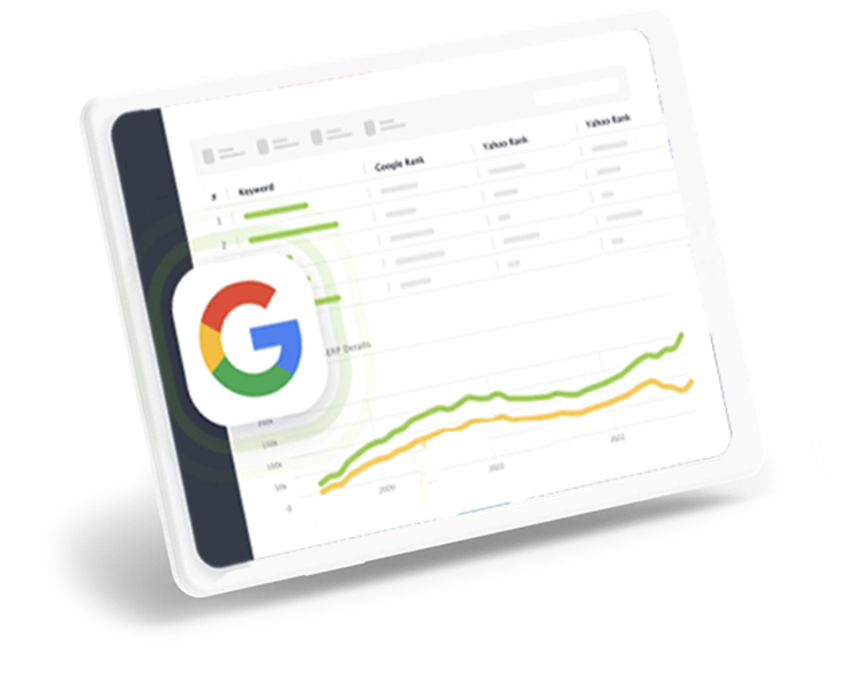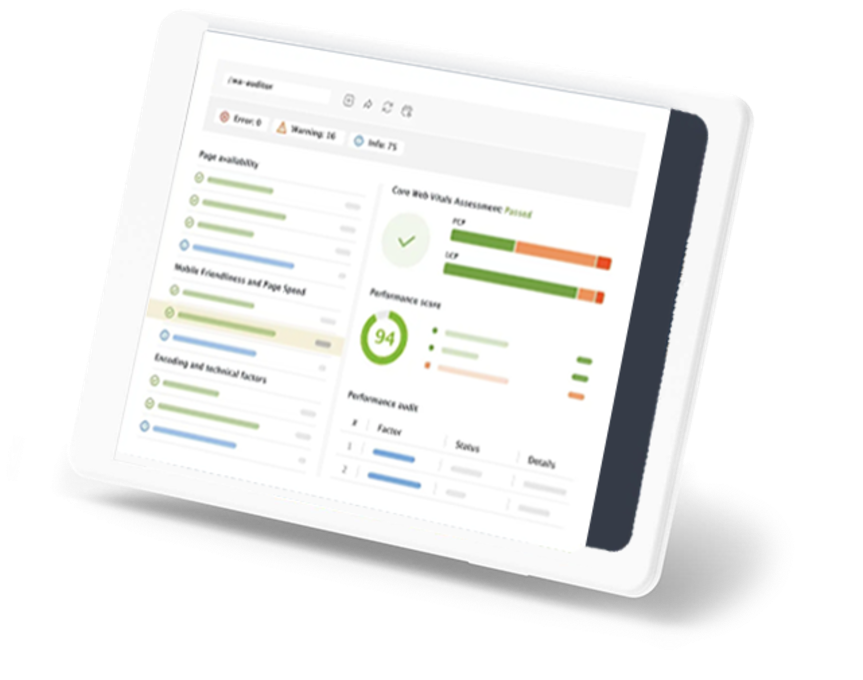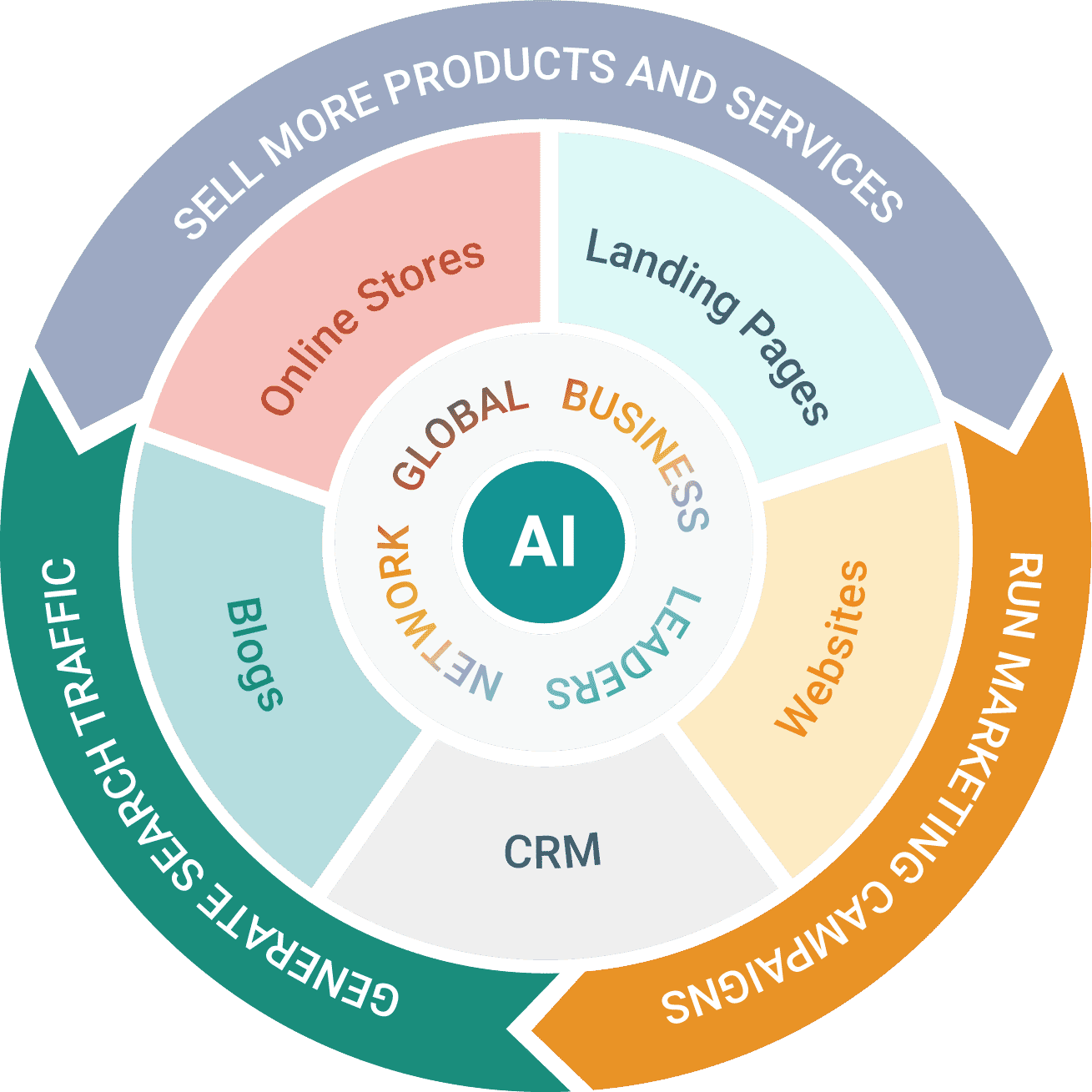How to Create Customer Advocates In Your Go-To-Market
Jay LeBoeuf Head of Sales, Descript
Nov 20, 2023
Mark Roberge: Hey folks, Mark Roberge here. Welcome to the science of scaling podcast. On this podcast, we talk to the top sales leaders in tech to learn the science behind how they’re scaling their revenue and sales. I’m so excited today to have Jay LeBeouf as our guest. Jay founded Descript sales team. Descript is at the forefront of AI technology.
He’s got a pretty eclectic background for ending up in the seat he’s in right now. Electrical engineer student at Cornell, uh, worked in some of the media tech companies back in the day, like Avid. He’s been lecturing over at Stanford university in an engineering department for over a decade. And here he is carrying his first quota, leading his first go to market team.
So he’s been at the forefront of thinking differently about using AI and go to market of cultivating champions. of developing a community led growth strategy. These are the new techniques we’re going to dig into with Jay. Let’s do it.
Jay LeBoeuf: So Descript is an app that allows you to edit audio and video as easily as editing text. And as collaboratively as we would use a Google doc. And one of the things we’ve pioneered is this text based editing. So you should be able to just select a word, a phrase, a paragraph you don’t want, hit delete, and it edits the underlying audio.
And video. And that’s one of like many auto magical AI things that we do. So we’ve raised a hundred million dollars so far. We’re a series C company funded by Andreessen Horowitz, Redpoint, Spark, and our series C was led by OpenAI.
Mark Roberge: It’s very cool. Let’s get into your journey here. I don’t believe you carried a sales quota before, you know, as I look at your background, you’re electrical engineering at Cornell.
You studied at Stanford. You’ve taught at Stanford for over a decade on more of the tech side. A lot of your roles have been on the R& D side of the fence. Tell us about how you ended up here.
Jay LeBoeuf: I was a very unhappy electrical engineer, but I was doing a lot of music on the side, playing in a band and in a lot of recording studios.
And For me, the aha moment was discovering that you could actually blend music and technology. And so my, my initial goal was I’m going to go to Stanford. I’m going to go to grad school. I’m going to become more solid in my technical chops, but with my creative and musical background, I’ll get out of company.
I’ll go in, make a huge impact, develop technology that supports creative professionals. And that was basically the first decade of my career was doing that on a more technical sense. And then the Kind of pivot towards becoming more of a business professional was leaving avid. So avid is a company that does product called pro tools and avid media composer, and a lot of stuff that’s used by the biggest recording and film studios.
I left that company because I wanted to do my own startup. It was 2008, very early time to do an AI startup, but I did one also in the media and technology space. And it was in the process of that startup that I realized I There are far better people technically than I am and that the best thing I could do to serve the vision of the company is to act as a business leader.
And that’s also how I began my, my quest into sales because we were doing something that the world didn’t know it needed. And I had to convince a lot of people otherwise.
Mark Roberge: That’s really cool. If I were to try to paint my perspective of the last 25 years of like sales evolution, maybe even longer in software, let’s say, you know, prior to the internet.
There’s a lot of anecdotal narrative that the best sales team won. And then the internet and cloud gave way to what we refer to today as like product led growth. Maybe it was called self serve. It was called like even application service provider way back in the day. But at the bottom line is like, you could literally just start using the product.
And the narrative and Silicon Valley was like, Hey, best product wins. Now, And for a while there was like almost an allergy effect. And then I think sometime in like 2010 or something, someone like stuck in SDR against their PLG funnel and like things accelerated and we got into this little bit of a hybrid now it’s like, how do you integrate these things?
More of the traditional sales stuff of like discovery and personalization of the message. Do you think that stuff is not applicable here? Because something changed.
Jay LeBoeuf: Well, the keyword you did mention there, Mark, was discovery. And that’s something that I think we can’t ever get lazy at. I learn so much. My team learns so much every day.
If we’re willing to ask the questions, if we’re willing to be constantly curious, if we’re willing to ask somebody why, even though we think we know the answer, what’s the harm in asking it? And We learned so much about how to describe the product, what new competitors are, what other solutions they’re looking at.
And then importantly, what’s the friction? Like what’s kept them from paying up until now? Why are they even talking to a human? You know, ideally our product is set up that you can do everything you need to do without talking to a human. If you’re talking to us, we’re almost a bug. So what’s the bug? Why, why, why?
We love you. Thanks for reaching out to us. We’re gonna, we’re gonna care for you. Give you everything you need, but why are you here? And then we can, oftentimes we can use that to make the help documentation better, make our pricing better. Um, it make our follow up emails, like have a few additional things because we actually do want to get you to like, get you to value, get you to the sale a little bit faster.
And if we can do that without either of us having to spend a half hour on zoom together. I mean, why not?
Mark Roberge: That stuck out to me. In our chat of like how quickly you went from, okay, we need to help the product engineering folks figure out our product market fit, like debug this thing, be the human loop, remove ourselves.
And suddenly it seemed like your North star core revenue acceleration was the development of champions. Can you talk about that? Like, how did you pick that? What does that mean? How do you. How do you codify that?
Jay LeBoeuf: One of the things that we realized was working really well is one, we have a product that in about one minute, I can demo it to you and no matter what your role at the company, you will.
Consider that what I just showed you is complete and total magic. So we could have a procurement person and I can show them how I can upload an audio file with all these background sounds and people talking and dishes clanking in the background. With one button, it all disappears and you sound like you’re on a broadcast quality microphone.
I can show that to procurement person and they’re like, wow, I’m just here to buy this thing, but that’s cool. So with things like that, you realize that People would end the call and they’re like, Jay, thank you so much for your time. Whoever they’re talking to a descript. Thank you so much for your time.
Let me know how else I can help. And what I always encourage, uh, especially when I’m, when I’m working with the university students, people will often tell them like, you know, let me know what else I can do to help. And I’m like, take them up on it.
Mark Roberge: Every single time. This is really interesting. This is an opportunity everywhere in the go to market ecosystem.
Jay is leaning into referrals. He’s, he’s talking about building champions. He’s talking about like when someone says, Hey, that was, this was awesome. Let me know if I could ever help you. And he says, take advantage of that. I don’t understand why we don’t codify that into our sales methodology as much. I don’t think I’ve ever come across a relatively mature sales organization that doesn’t have a cold calling script, but it’s really hard for me to think about.
A mature sales organization that has a generate referral script. That’s an opportunity and Jay’s bringing that to life. Let’s get back to him.
Jay LeBoeuf: If you think there’s some logical way that they can provide value and it’s, and it’s a pretty authentic ask that that customer or person could deliver. So now imagine that.
The person comes in the door, we give them a great demo, they purchase the product, we continue to support them, check in on them every now and then, provide them new training materials. The day comes, their account is now like 5, 10, 15 people at their company. Now, they still reach out to me, even though, you know, we’ve got a team in place that’ll handle it, they’ll still reach out to me, I want to maintain a relationship with them, but I realized they’re so passionate.
They always will still ask, what else can I do for you? We wanted to tap into this. So we call those people champions internally. Often they’re the first person from an organization that comes into the door. They feel like they’re the ones in their company that have discovered Descript. They’re the ones that have evangelized for us to, you know, get the, get the, get the PO through, uh, set up the initial team.
But then they also start acting as a, like a custodian for us in their, in their company. They handle the first wave of support requests. They introduce us to new teams. Are the people that I can reach out to when I’m going to a conference and I need to stack it with people on a panel or our PR team wants to talk to people in the learning and development space I reach out to those people and it’s this wonderful relationship because.
Now I’m elevating them because I’m bringing them onto a panel. I’m showing them as a thought leader for the risk that they took to use Descript.
Mark Roberge: I’m struggling with this a little bit. Like Jay’s using the word champion, obviously a word that has been used in sales for a long time. And it’s usually in like enterprise selling where you want to have a very strong champion that can get a deal done.
And there’s a lot of practices out there, best practices out there on how to develop a champion and know if you have a strong champion. I don’t know, he’s talking about something different here and I’m trying to get at it. I just want to point that out and let you reflect on it a little bit too. Cause it might be a piece to how sales is changing and how our perception is changing.
With our buyers and our power users and our champions is changing. So I think this is a really important comment by Jay. I just want to point that out.
Jay LeBoeuf: And then the more we teach them about Descript and all the ways that we can make their audio and video more impactful, they’re able to teach those skills to other people in their company, which makes them a more valuable employee, a better thought leader, a better communicator.
So it’s, it’s this wonderful flywheel we’re super early days. Like my community manager is listening to this right now being like, we’re really just getting started. Don’t overpromise, but we believe in it and we’re going to invest in it.
Mark Roberge: Can anyone be a champion at a company or do you have to teach your team like who would be a good champion versus not?
Jay LeBoeuf: Well, one of the, one of the key criteria in this, this could be obvious, but you want to make sure that they’re happy first. That they have absolutely no equivocations with the product. Even if they have feedback or feature requests or bugs that they feel are longstanding, they feel genuinely heard. They know when we’re going to get to those, or if we’re never going to accommodate their feature requests, they know exactly why.
So if they are happy. If they know that Descript listens to them, trust them, and you know, we value their feedback, I think it flows both ways because they feel that and there’s almost a sense of like, well, what can I do for Descript? You guys have been so good to me. And at no part in this, Mark, or is anybody talking about like, Hey, you know, I, I give you guys 10, 000 a year.
That’s what I do for you. Like we, we just kind of go past that and we go back to the relationship piece, which is that like human to human thing that maybe sometimes we forget You know, Dscripts doesn’t have an enterprise relationship with HubSpot, for example. Dscripts enterprise relationship is with Drew, the head of user research at HubSpot.
If Drew gets hit by a bus, we need to rebuild up new champions at the company because come contract renewal time, if the new person put in, put in charge, doesn’t know about us or isn’t happy with us, we’re going to have a heck of a time. So
Mark Roberge: it’s make them happy. I’m kind of putting words in your mouth, but it’s like, listen to them, listen to what they care about.
And even if we don’t have it, Make them feel heard. How do you check that they’re happy? Are you just like send an MPS out? Or like, how do you know they’re happy?
Jay LeBoeuf: We’ve got qualitative, we’ve got quantitative on the quantitative side. We use amplitude internally, so we actually can look at their team account, look at their product usage.
That’s a great indicator of, you know, Descripts and audio and video editing app. So. How frequently is this team actually publishing audio, publishing video, making edits last logged in? Uh, those are, those are ways that they’re using the product. So things are, things are good and trending and they’re getting good value from it.
Uh, the other piece then is what we can determine from. Uh, our success calls. So one of the first pieces of wisdom given to me, uh, this was by, uh, Travis Bryant, who was at red point for a while. He was at optimizely before that at Salesforce. Before that Travis was like, dude, you gotta start recording your calls.
I’m like, ah, it’s kind of creepy. He’s like, no, no, no. Get in the habit as soon as you can, because you have an opportunity to share your learnings in the voice of the customer at every opportunity.
Mark Roberge: That’s interesting. How do you know if your customer is happy? And I suggested MPS and he was like, okay, we use a quant approach, but then he didn’t go to MPS.
He went to amplitude. He went to usage data. I think that’s very powerful. Like MPS is cool. MPS is an amazing, uh, innovation. And the last. And helps us see whether they’re happy. And I’ve seen companies have great success using MPS to drive this, but MPS is a survey and there’s reams of research that shows that surveys can be mislead that people sometimes may be hesitant to share honest feedback in a survey, but when you’re speaking with your clicks and your mouse and your usage, that’s more powerful.
I think. And it’s, I just find it really interesting that Jay is, Trying to evaluate customer happiness first with the usage and identifying those champions and those Those power users, let’s get back to Jake.
Jay LeBoeuf: And so we adopted grain, I think at the end of 2020, we’ve recorded every call since we now use that insight.
We share on Slack every day when we hear something new, when we hear someone who’s really unhappy, we share it in their own words to the product team or to the support team. And when we hear people that are really, really happy, we share it to our community team to say, this person. It’s a candidate for champion.
Mark Roberge: That call recording is so important. I need to ask you, okay, like 10 years from now is the sales team. Today’s sales team is like the CRO who oversees four directors who each has five managers and each of them have, you know, eight reps each year. There’s a bunch of SDRs. There’s a sales ops team. There’s whatever.
Is that all replaced by, uh, a go to market data scientist that’s just running the AI?
Jay LeBoeuf: Well, I, I don’t know the answer to that. Mark, I’m going to analogize it to something that I heard you say. I think it was on the, on the grit podcast of you’re, you’re telling the story of you got, you got job recs for 20 more, 20 more heads, and you approached your original sales team and basically said, I’m going to give the money to you guys.
I think you can do it. I think you can do more with what you have. So. Where I think we’re at right now is we have a small team. There’s three people. On our sales and success team. I know it sounds extraordinary to everybody here. Like, well, that’s so lavish. How do you spend that a hundred million dollars?
I can assure you it’s not on sales and success. We are trying to give the entrepreneur generalist sales and success team. We have access to whatever. Tools and technology they need to be as empowered about what the customer needs to share insights and basically to act as a force multiplier for their skills.
Mark Roberge: I didn’t even remember that. That’s actually a perfect place to bring in my commentary on the grip podcast. And now Jay’s making me connect some dots here. He’s helped me connect some dots and what he’s referring to is this. How do you know what the quota of your salespeople should be? You’re about to build a sales team.
How do you come up with that? And I don’t think the industry does that. Well, I think most people say, well, we’re running an inside sales led growth motion. So of course we’re going to pay our salespeople 140, 000 a year. And of course their quote is going to be 600, 000 a year. Cause that’s what everyone else does, or we’re running an enterprise sales motion.
And of course we’re going to pay our people. 300, 000 a year. And of course their quarter is going to be a million dollars a year. But I think that’s super suboptimal. And I think it’s hard because like at the end of the day, your constraint is a 40 hour work week or whatever you want your reps to work and how they can make that most productive.
But when you start out just like, yeah, we’re running sales like growth, you know, 140, 000 a year, 600, 000 a quarter. You sort of like pinpoint yourself. You peg yourself to that expectation. But especially today. With AI and you’re scaling up a team, you have an opportunity to say, I don’t know, all I know is I have two reps, right?
I have three reps today. And over the last couple of months, they have averaged what’s going to end up being 700, 000 of ARR. And I want to see how high they can get this. I want to challenge them to do more and I’m not going to raise their quota. I’m just going to put that money in their pocket when they do.
So that’s going to be a big opportunity for us. If we’re starting out. With AI technology to rewrite that formula that we lean into prematurely. All right, let’s get back to Jed.
Jay LeBoeuf: So That’s, you know, really where we want to invest right now is helping our team do as much as possible. And then honestly, before adding more people, I think we really want to figure out, do we need to because our, our desired motion, and then this, this applies just to us, I’d say, you know, or companies that feel like they are us a bottoms up product led growth.
No self service company at its core. We do have enterprise, but it’s enterprise with a little e. These aren’t gigantic contracts that we’re going out trying to hunt for. These are companies coming in that are pre qualified. They’re telling us we need Descript. And so I want to arm my team with as much You know, knowledge and AI is possible.
And, you know, it started with, Hey, everybody, we get Clearbit. We actually can learn who everybody is as they’re coming in. And now, I mean, the sky’s the limit. We can have it as our deal making assistant. Um, on my, on my list to experiment with, there’s several companies and tools for helping you with security reviews.
There are several tools that help you with, uh, legal contract review. So I don’t have to always go to the lawyers every single time. They can help me more intelligently decide what’s a risk and what’s not. That’s something I think will really help us.
Advertise: Talking 2 Loud, hosted by Chris Savage, is brought to you by the HubSpot Podcast Network, the audio destination for business professionals. On this podcast, Chris Savage, Wistia’s CEO and loudest talker, takes you inside the minds of entrepreneurs as they share the hilarious, informative, and most challenging aspects of building more human brands.
You can hear episodes like building a reusable notebook empire with entrepreneur Joe LeMay or the AI video revolution with Wistia’s own head of production, Chris Levine. Listen to Talking Too Loud, wherever you get your podcasts.
Mark Roberge: You’ve mentioned the word, like, in a way we’re a bug, you know, if I could quote you in the process, if we have to get involved, you’re talking about, you know, try to just drive productivity and streamline and use technology. Do you think like, you’re going to see this at your company or we’re going to see this at companies where like culturally, maybe some of your frontline people are like concerned, You know, like I don’t want to feel like a bug and I’m doing all this work.
Am I actually just putting myself out of a job? I think sometimes in ITech we felt that, but like, it’s very real with AI.
Jay LeBoeuf: Yeah. So if we, if we look at ourselves as first of all, we all work for Descript. Another thing that you should know about my team and how I’m trying to do things here is we are a non commissioned sales environment.
So I want everybody doing what’s in the best interest for Descript, similar to a software engineer and our teams can best allocate their time to which bugs they work on and roughly what order and how much time they invest on them. I think Our sales and success team, we’re pretty rigorous about how we prioritize our time, but really our job is to help with the go to market function of getting into more businesses, more creative agencies, more studios, and then also like create a repeatable framework and maybe it relies on humans.
Maybe we discover one of the secret sauces is Descript demo as done by a human with our passion and our energy. And our ability to remove any obstacle in the path that leads to 10 X bigger ACVs than if we’re not involved, at which point then that’s a scalable, repeatable process that we discovered. And then we can see how efficient we make that.
I don’t see ourselves putting ourselves totally out of business.
Mark Roberge: Why’d you go in non commission?
Jay LeBoeuf: The short answer is. I have absolutely no experience as an enterprise sales professional. I have always wondered why it was a thing. I always felt extraordinarily driven and hardworking, and I didn’t feel like I would ever do anything different if I had a commission.
But there’s also a lot of examples that I’ve come across, Mark, and especially since we’re, we’re very, we’re still very early days of what we’re doing, that we would have made some decisions that Run at odds with what the product team needs. We would have sold into org organizations that might not have been good long term customers.
We would have made some deals that could have churned within 12 months, 18 months and reflected very poorly on us. And, um, you know, right now I put a premium on us landing a deal with a well known customer that has high growth potential.
Mark Roberge: Okay. Let’s unpack this commission discussion for a second. Well, first off his last comment here of like a commission plan would have ruined the first phases when they’re trying to iterate product and voice of customer and debugging.
It’s like. Yeah, we don’t need a commission plan designed in there. I’ve used it completely agree. Don’t use a comp plan until we have like product market fit during the product iteration. It’s just not right. And the people that you attract to the job are not right either. They should be at equity, kind of a base salary.
They’re part of the team finding fit. What I find to be intriguing is he’s scaling a lot of commission plan too. Seen it here and there. Daniel Pink talked about and to sell as human. Every time I’ve seen it, someone runs a test next to it. And the traditional comp driven variable compensation driven salesperson outperforms.
I don’t know why I agree with Jay’s sentiment. It’s like the engineers aren’t a variable comp plan, but they’re really productive. I mean, the skin in the game is they keep their job and they have equity. Why can’t that be the case for sales too? And if it’s so unique with commission, why don’t we put engineers on commission plans too as well?
That’s a complicated one. We’ll see how it plays out for Descript. Okay. Let’s get back to Jay.
Jay LeBoeuf: And it doesn’t matter if it’s 12 months, 18 months, we’re, we’re at a stage that we can make these bets. We can learn from these customers, bring them into the fold. If they’re only two, three, four, five users, it’s really not a good use of people’s time to be closing a lot of those deals.
So if they were commissioned, I can see they, they, they might want no part of that and they feel like I’m disincentivizing them to do those. So I actually want to do what’s best for Descript right now, which is to basically focus on learning, not selling.
Mark Roberge: I love that innovation. The last piece that we have to unpack that I also think is important for your vision in your role is community led growth.
You mentioned it a little bit earlier. You mentioned. Uh, notion being a company that a lot of people look up to on that, you know, personally, I feel like I’m very bullish on community growth. I was very bullish over the years on product led growth. I think they have similar parallels and we’re probably like community led growth might be lagging by, you know, four or five years.
We’re in the infancy. Can you tell us what it is? From your perspective and why you are leaning into it so much, a descript.
Jay LeBoeuf: Absolutely. So let me, let me first go by defining it. So I look at community, community led growth is ways that we can set up. Events, activations, ways for our community, our users, and prospective users can interact with each other, can find value in interacting with each other, and can help each other obtain better usage of the Descript product.
And through that better usage of the product, through product education, through sharing inspiring stories of how they use Descript to create a popular YouTube video, and then breaking down how the video is made, that is then Educate and empower future users way better than if I created the videos with our marketing team.
Where did this come from? Um, in my career, before way before you would consider community community led growth. I first would see it at Avid. So again, Avid technology makes all these tools for audio recording, video recording, film, TV. They would put on these dinners and they would invite the biggest music producers, the biggest Hollywood producers, the biggest movie makers.
That are the power users of the tool. And we would do a dinner for them at conferences and trade shows. And from, from that experience, you’d have like the inner inner circle and those people would give you invaluable feedback. They’d introduce you to new studios. You’d make deals out of a dinner like that.
And you weren’t even anticipating it happening.
Mark Roberge: I’m having another light bulb moment now. It’s like, I knew he was a big proponent of community led growth and I love community led growth. I love methodologies that put the customer at the center of it. At the same time, he is calling this thing champions, but I really think in our more normal nomenclature today, he’s all about jetting referrals.
And I’m really starting this to see this like culture coming together, this go to market culture that’s built on top of this community led growth approach that I hadn’t seen before. And I, I think Jay is doing some really special stuff with his commentary on And his commentary on cumulative growth, which I hadn’t seen connected, but they’re very much in the same bucket.
I think we’re onto something exciting here. All right, let’s get back to Jay.
Jay LeBoeuf: But towards the outer rings, you’d have these forums. One of them was the DigiDesign user group or DigiDesign user conference, where users were basically not only sharing tips on like how to fix bugs with each other, but You know, here’s how I recorded the snare drum on this classic track, or here’s how I get the best tone out of my guitar amp.
These were just inspiring places that the more people who were in those forums, bigger the user base got and the more informed and educated it became. And I started seeing this, like every great company, every great tool provider. Has their version of this and sometimes it’s on discord. Sometimes it’s a private slack.
Sometimes it’s live events. Um, when we wanted to crystallize around a model that we’re going to shamelessly copy, we looked at Notion. So credit to Ben Lang and the team at Notion. Also for all the insight and wisdom they’ve given me. They have this insane community where they have users who will not only share their templates with others, they’ll teach you how to build templates.
They’ll teach you how to use the templates. They will host pop up events entirely owned, planned, and operated all around the world by these passionate users. And these users Maybe they’re on like a 30 a month plan. It’s not that they’re the highest ACV users or like champions with a capital C, but they’re people that are kind of more powerful than that.
They’re people that are going to invest their time, their credibility, their energy. Towards educating and empowering other users. If you have a product that just has this wow factor, I, I made that up. It’s a horrible term, but just something where you’re looking at it and you’re like, this, this is magical.
I would do anything about this. And there’s only like a few tools in my life. I feel that way about if any other company asked me to be a champion, I’d say no, except for these like, you know, top two or three tools.
Mark Roberge: So if someone’s out there listening, a founder or an early sales leader, they’re like, well, we got to do that.
How do you get started with community?
Jay LeBoeuf: Talk to your community, find the people that you feel like are your biggest fans. Even if there’s only, if your company has 10 customers, find the ones that like, you’d be most likely to want to go out to dinner with or have a cocktail with. That’ll just tell you straight up what’s going on and what they need and treat it as customer discovery.
Just as you would go to those customers to figure out what to build next or where the market’s going, figure out where they’re hanging out, figuring out what else they need to accomplish their job or to solve the problems they have or to. You know, make them better creatively. And so by bringing in those early pioneers, you’re going to hear a lot of things.
Like where do they hang out? Do they want to discord? Are they better on Slack? Do they like to go to live events or do they like to do virtual events? You know, you’re going to learn a lot very early on after 10, 20 conversations. You probably have a good idea. And then just, again, keep up that curiosity.
Keep asking why as you go along.
Mark Roberge: Jay, we’ve explored so much ground. On sort of the forefront of go to market. I’m so excited that someone like yourself found yourself in this role in a company like Descript. So I really appreciate you dropping this knowledge with us today.
Jay LeBoeuf: Thank you, Mark. Thanks for having me.
Mark Roberge: Today’s episode is written and produced by Matthew Brown. Our show is edited by. Big thanks to HubSpot for Startups and to the HubSpot Podcast Network for keeping the audio on. Hey, also we’re a new show, so if you like what you hear, or if you hate what you hear, leave us a rating and review over on your favorite podcast player.
I love the feedback. Also, check out Stage 2 Capital. We’re the first VC firm running back by over CCOs. So if you’re an entrepreneur looking to scale your business, check out stage2. capital. All right, that’s it for today. I’m Mark Roberge. See you next week.
Source: https://youtu.be/zo9xj9L7f4c?list=PLxEk_-9hb_F9UpZHfacUr9N3YbjnuKabX

